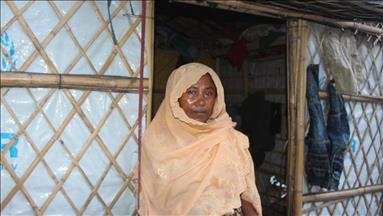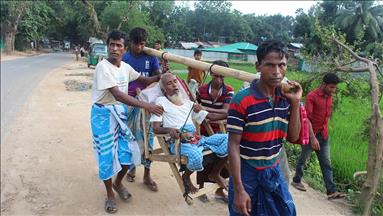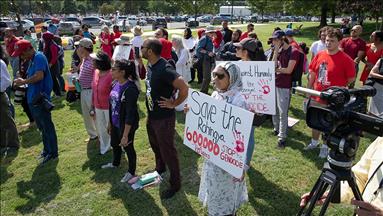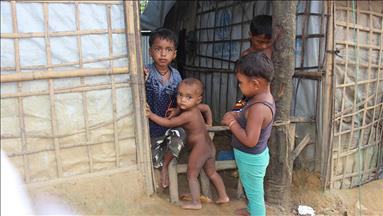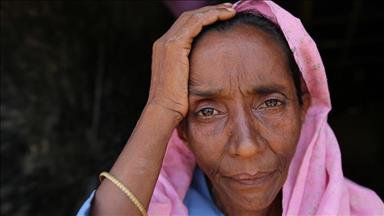Rohingya languish as repatriation process linger
Bangladesh official tells Anadolu Agency repatriation delayed by Myanmar on anniversary of Rohingya massacre
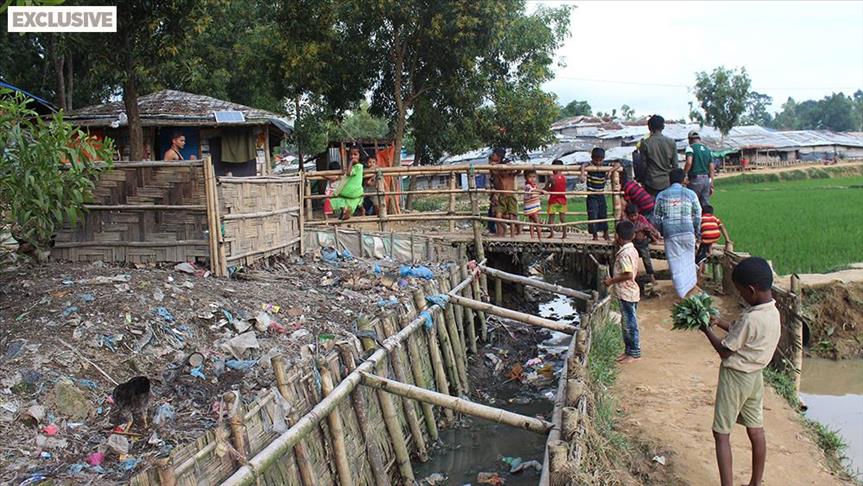
By Sorwar Alam
ANKARA
While Bangladesh and Myanmar blame each other for a stalled repatriation process, Rohingya Muslim refugees have continued to suffer in tiny makeshift camps in southeastern Bangladesh.
It has been one year since the ethnic minority Rohingya faced massacres by the military beginning Aug. 25, 2017, and fled to Bangladesh. But they have been living in poor in refugee camps in Cox's Bazar with little hope returning home.
The issue of repatriation has existed in only official statements and official visits between Bangladesh and Myanmar.
Dhaka and Yangon inked a deal last year to repatriate hundreds of thousands of Rohingya following the military crackdown in the western Rakhine state of Myanmar.
The deal was sharply criticized by the international community, rights groups and Rohingya organizations, but officials from Myanmar and Bangladesh voiced their determination for repatriation.
According to the deal signed Nov. 23, 2017, the repatriation would be launched within two months of the agreement.
But there are has been no notable steps from the either side despite a recent visit to Yangon by Bangladeshi Foreign Minister A.H. Mahmood Ali.
Dhaka claimed the trip was “fruitful” but experts on the Rohingya issue said Ali returned home empty-handed.
Both countries formed a joint working group of 15 officials each to oversee the repatriation process.
The first meeting was in Nay Pyi Daw, Myanmar, on Jan. 15-16.
Bangladesh authorities repeatedly stressed Rohingya repatriation would be launched in due time.
Several meetings were held with not much movement on the fate of what the UN calls the most persecuted people in the world.
However, Bangladeshi Finance Minister Abul Maal Abdul Muhit openly voiced clear doubt about the repatriation process.
On March 6, Muhit told reporters, “I do not believe the Rohingya can be sent back.”
His statement was echoed by Rohingya experts and several advocacy groups across the globe.
A total of 23 Rohingya organizations released a statement June 10, voicing criticism of the deal and said it did not address the root causes of the Rohingya crisis, particularly Rohingya citizenship and ethnic identity.
“Repatriation is a life and death question for the whole Rohingya people," the groups said, adding they could not trust the Myanmar government and military that have killed, raped and starved its people with hundreds of villages razed, seized land and homes bulldozed.
'Myanmar delayed repatriation process'
Mohammed Abul Kalam Azad, commissioner of the Rohingya Relief and Repatriation Commission (RRRC) told Anadolu Agency on Saturday in Cox’s Bazar that the repatriation process was delayed due to Myanmar government’s reluctance on the issue.
"Myanmar has built some camps in the Rakhine state for the Rohingya who would return, Azad said. “But Rohingya told us that if they had to stay in camps after their return to Myanmar, they would prefer to stay here in Cox’s Bazar.”
Moreover, their safety, basic rights, freedom of movement should be ensured, he added.
“It is very unfortunate that a leader like [Aung San] Suu Kyi make falsified statements against Bangladesh to cover-up their own failure and shortage,” said Azad.
The Myanmar leader on Tuesday blamed Bangladesh for the delay in repatriations process, stating it was up to Bangladesh to decide how quickly Rohingya refugees would return to Myanmar.
"The returnees have to be sent back by Bangladesh. We can only welcome them at the border," Suu Kyi said at an event in Singapore.
Rohingya demands safety and identity
Azad, however, thinks it is the Myanmar government who must ensure the safety and dignity of the Rohingya for their return.
"Both countries had agreed that the repatriation would be permanent, in a safe way and voluntarily," Azad said, highlighting that Bangladesh would not send them forcibly.
Pointing to a recent tour of Myanmar by a Bangladesh delegation led by Foreign Minister Ali, Azad said Myanmar promised to renovate some villages for Rohingya without giving a time frame.
“During the visit, they told us that they had initially selected 42 villages in which they will build houses for Rohingya. That means they will rebuild those villages. They also shared plans for supporting farmers, as well as providing other benefits. But they did not tell anything about when the implementation process will be started.”
Rohingya living in poor conditions in camps said they would stay where they are rather that return to Myanmar "if our life safety and identity is not ensured".
"If they do not give us basic rights and identity of Rohingya, we would prefer to die here in Bangladesh camps with limited access to livelihood," said Mohammad Yunus, a 50-year-old father of two daughters.
Persecuted Rohingya
Since Aug. 25, 2017, more than 24,000 Rohingya Muslims have been killed by Myanmar’s state forces, according to the Ontario International Development Agency (OIDA).
In its recent report, Forced Migration of Rohingya: The Untold Experience, the OIDA increased the estimated number of murdered Rohingya to 23,962 (±881) from an earlier Doctors Without Borders figure of 9,400.
More than 34,000 Rohingya were also thrown into fires, while over 114,000 others were beaten, the OIDA report said, adding that 17,718 (±780) Rohingya women and girls were raped by the Myanmar army and police. More than 115,000 Rohingya houses were burned and 113,000 others were vandalized, it added.
According to Amnesty International, more than 750,000 Rohingya refugees, mostly children and women, have fled Myanmar and crossed into Bangladesh after Myanmar forces launched a crackdown on the minority Muslim community.
The Rohingya, described by the UN as the world's most persecuted people, have faced heightened fears of attack since dozens were killed in communal violence in 2012.
The UN documented mass gang rapes, killings -- including of infants and young children -- brutal beatings, and disappearances committed by Myanmar state forces. In its report, UN investigators said such violations may have constituted crimes against humanity.
* Mutasim Billah from Cox's Bazar, Bangladesh contributed to story.



